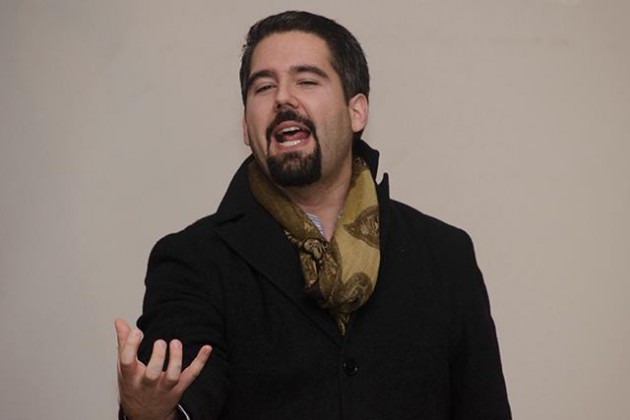
Spoken word poet José Canta brought his syncopated rhythms and artful language to Friend’s Hall for this week’s Tuesday Night Live. The College Programming Board’s biweekly event corresponded with Latin Heritage Month this week, and fittingly Canta expressed his Latin-American perspective through his work.
Spoken word is a type of rhythmic poetry that is typically written to be performed. For many Ramapo students, Canta’s show was their first experience with spoken word.
“I’ve heard of other kinds of poetry before and I like it; I think it’s really pretty,” freshman Matt Searfoss explained. “I’ve never really experienced spoken word, per-say. This is my first event to hear it. I hope to see something different that opens my eyes to a new form of poetry that I’ve never really experienced.”
Before Canta took the stage, the show began with student opener Ehi Igiehon. Igiehon describes himself as a singer, songwriter, producer and spoken word artist. Igiehon’s three pieces included a poem called “Digest,” another poem that incorporated music and a final a cappella performance of the song “Beautiful Girls” by Sean Kingston.
After Igiehon’s set, José Canta began his performance by lighting a candle within a figurine of Ganesha, the Hindu God. Canta explained that poetry is worship to him and reflects his devotion to Buddhism.
Canta first began spoken word poetry after hitting a personal low. Seeking a change of scene he moved to Richmond, Va. and happened upon a café where people were performing their poetry.
“What’s interesting about things is that you don’t find them, they find you… I went to a café one night and there were these people on stage and some of them were talking about having parents who died of cancer, some were talking about body issues, oppression and I just found my home… If people just told their stories they would realize that we’re so similar,” Canta said.
Canta’s set was fortified by personal experience. He included deeply personal poems, including one called “Bungee Jumping,” which described his suicide attempt. Other works included an interpretation of Allen Ginsberg’s “Howl” and a poem dedicated to his mother, entitled “Familiar Darkness.”
Canta’s Latin heritage also flavored his work, and he tackled subjects like oppression and immigration.
“When I was your age I defined myself by my Latinoness… Eventually I just became human because I realized that at the end of the day everyone suffers, whether you’re the oppressor or the oppressed,” Canta explained.
The students of Ramapo responded favorably to Canta’s passionate and, at times, controversial performance. Canta offered the chance for students to ask questions at the close of the show, and talked to a few one-on-one after the show ended.
“I thought it was really inspirational because José was really motivated and he came prepared. The way he executed his speech was really good and I think he spoke with a lot of passion and conviction. He made it seem really believable. It was a really good show, overall,” freshman Jared Hayden said.
The conviction that impressed Hayden is exactly what Canta cites as his reason for performing.
“I’ve done shows at colleges where there have been three kids in the front and I loved it, because this is my worship,” Canta said. “I’ve done shows with 500 kids and you have to look at it the same way because this is your passion. Go after your passion and do what you love because the world needs it right now.”
—
rking2@ramapo.edu






